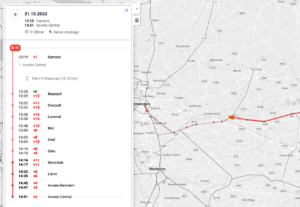How to actually build Europe-wide multimodal public transport booking platforms

On Page 29 of the draft European Parliament election programme of the German Grüne (full PDF in German here), you can find this text (my translation):
What is taken for granted when booking flights should in future also be standard for all train journeys in Europe. With a cross-provider ticketing system, we can enable booking platforms to offer end-to-end tickets, including sharing offers, for everyone. The cheapest tickets will be made easily accessible. Travellers will be provided with clear and transparent information on the costs, journey times and climate impact of each travel option and will be able to choose the best option for them. To bring Europe closer together by rail, bookings need to be made easier.
That this text is in the result of my work within the party – this proposal emerged from a workshop I ran at a congress to prepare ideas for the programme in March this year.
Anyone who has ever tried to book an international journey by train (or a combination of train and some other mode of public transport) can understand this problem, and hence why it needs to be fixed.
But while the need is clear, how exactly could this be done?
This article will sketch out the broad approach – legally and technically.
As a starting point I do not mind who builds such booking platforms – and note that the mechanism sketched out here would allow different providers, either publicly or privately owned, to have a go. That is also the reason why the text says platforms, plural.
There are four building blocks for any such platform to work, and I will examine each in turn.
- Journey planning
- Ticket purchase
- Live running data
- Passenger rights – in case something goes wrong
Journey planning
Before you come to actually buying a ticket, you need a good route – and this route might combine multiple modes of transport, and perhaps even walking and cycling too. In Germany at the moment the best tool for this is Deutsche Bahn’s Navigator App, or Reiseauskunft on the web.
The problem is that the moment you cross a border into another EU Member State things do not work so well. In most other countries you might get trains shown, but likely not buses or trams, or walking directions.
This is because DB data beyond Germany’s borders comes from UIC Merits, and that has a couple of problems as a data source – there are holes even in the rail data (as I outline here), and it has pretty much no non-rail data in it. My efforts to enquire with UIC about the missing data have been blanked until now, and the EU has shown no interest in mandating data sharing with UIC, so that looks to be a dead end.
The solution is to use NeTEx data instead – and each Member State of the European Union is mandated to publish this data through National Access Points.
The MOTIS Project of the Technical University of Darmstadt has shown what you can build with this data – background about the project here, and a live demo here. Having spoken to the lead developer of MOTIS, adding all EU countries to their tool would not be a complex task – it is a question of time and server resources.
So the legal and technical requirements for this block are largely already fulfilled.
Ticket purchase
A bunch of startups – Omio, Trainline, Trip.com, Raileurope, All Aboard, Railtic etc. – have been queuing up to try to solve this one, as this is where the money is theoretically to be made.
But there are three problems with these tools at the moment.
Firstly, the routing offered by these platforms is often quite horrid (as I document here) – and this negates my first point above. Secondly, there are holes in the ticketing data – where public transport operators refuse to let others sell their tickets. Third, the commission that rail companies will offer for such platforms to sell their tickets is often so low the platforms cannot survive – that was the crux of the case brought by Omio and Trainline at the German Bundeskartellamt.
There was hope that the EU would help solve the problems with ticketing data – the Multimodal Digital Mobility Services Regulation (MDMS) was due to be proposed this autumn, but failed at the European Commission’s Regulatory Scrutiny Board, so has been shelved at least until after the European Parliament Elections 2024 – at least in part due to lobbying from state incumbent railway companies dead set against data sharing.
But the need for a MDMS Regulation does not go away – and it would need to be a Regulation that makes data sharing for ticket reselling obligatory for all public transport operators, including all railways, and ticket resale terms based on fair, reasonable, and non-discriminatory (FRAND) principles.
For this block to be complete legal changes – EU wide – are needed, and a combination of the routing provided by MOTIS and the ticket reselling offered by Omio or Trainline would offer a better commercial solution in the short term than anything else on the market at the moment.
Live running data
 Is my train or bus on time? And – importantly – who should tell me if there are disruptions if I had booked a ticket previously?
Is my train or bus on time? And – importantly – who should tell me if there are disruptions if I had booked a ticket previously?
Traditionally this has been the preserve of the operator of the service. But if your service involves multiple modes and multiple operators, this can become messy.
Here too the Bundeskartellamt case shows how little data Deutsche Bahn is willing to share with third parties – Omio and Trainline are not allowed access to this data so as to pass it to their customers – the customers have to go to DB directly.
Yet here too MOTIS shows what is possible – click on any train on their map in Belgium (or the screenshot shown here) and you can get live running data from the NeTEx data. And from that a means to receive email or push notifications about a given train on a given day could be built.
For this block we again need legal changes – EU wide – to mandate data sharing from public transport operators. MOTIS shows that the technological solution is already in place to provide this information to end consumers if they want it.
Passenger rights
An area of nightmarish complexity at the moment, with the railway companies pushing Railteam hop on the next available train (HOTNAT) and the Agreement on Journey Continuation (AJC) as alternatives to legally binding rules to help passengers in the case of disruption. I tried to get my head around these agreements in this post and diagram, and I am not sure I have it all right.
The crux is this: even if your booking was made with one financial transaction, you might be left stranded in the case that your journey has multiple tickets from multiple operators.
The solution here is a hop on the next available train legal right, regardless of operator – and for this as well new EU law would be needed.
There might be times when this is practically not possible – a train is full to overflowing for example. And some rail operators might be the ones causing more problems, while others are the ones picking up the problems – and all of this might need a financial compensation mechanism between operators. But given that most rail routes, even now, have only one operator, it is simply unacceptable that a passenger is left stranded or out of pocket if something went wrong earlier in their journey chain.
Rail firms have long insisted a “through ticket” is the solution here – that if I have a single ticket for my trip everything is OK. But you cannot even get that within some countries of the EU, let alone when crossing borders. And trying to get the decrepit IT systems of some European railways to spit out a through ticket is never going to work. An insistence on through tickets is hence a recipe for inaction by the railway firms.
In the meantime there is a partial solution that platforms could offer – to borrow the concept of virtual interlining from airlines. If a platform were to sell me – say – a Madrid-Strasbourg journey with Madrid-Lyon on a Renfe train, and Lyon-Strasbourg on a SNCF train, by default I would have no rights to take a later Lyon-Strasbourg if I missed my connection. But a virtual interlining solution – essentially an insurance product on top of the ticket sale – would mean the ticket seller would re-book me onto the later train at their costs rather than mine.
This block also needs legal changes, although a virtual interlining solution would offer a partial short term fix.
So there you have it. Want platforms that allow passengers to book any multi-modal public transport trip, even cross border? You need quite some legal changes, EU wide, to make it work, although in the meantime a clever combination of some existing tools and borrowing a concept from the airline industry could help a little.
The post How to actually build Europe-wide multimodal public transport booking platforms appeared first on Jon Worth.
Source: https://jonworth.eu/how-to-actually-build-europe-wide-multimodal-public-transport-booking-platforms/
Anyone can join.
Anyone can contribute.
Anyone can become informed about their world.
"United We Stand" Click Here To Create Your Personal Citizen Journalist Account Today, Be Sure To Invite Your Friends.
Please Help Support BeforeitsNews by trying our Natural Health Products below!
Order by Phone at 888-809-8385 or online at https://mitocopper.com M - F 9am to 5pm EST
Order by Phone at 866-388-7003 or online at https://www.herbanomic.com M - F 9am to 5pm EST
Order by Phone at 866-388-7003 or online at https://www.herbanomics.com M - F 9am to 5pm EST
Humic & Fulvic Trace Minerals Complex - Nature's most important supplement! Vivid Dreams again!
HNEX HydroNano EXtracellular Water - Improve immune system health and reduce inflammation.
Ultimate Clinical Potency Curcumin - Natural pain relief, reduce inflammation and so much more.
MitoCopper - Bioavailable Copper destroys pathogens and gives you more energy. (See Blood Video)
Oxy Powder - Natural Colon Cleanser! Cleans out toxic buildup with oxygen!
Nascent Iodine - Promotes detoxification, mental focus and thyroid health.
Smart Meter Cover - Reduces Smart Meter radiation by 96%! (See Video).





